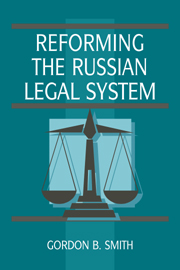Book contents
- Frontmatter
- Contents
- Preface
- 1 Pre-revolutionary Russian law
- 2 The Bolshevik experience
- 3 The history of legal reform
- 4 Forging a new constitution
- 5 Citizens and the state: the debate over the Procuracy
- 6 In search of a just system: the courts and judicial reform
- 7 Law and the transition to a market economy
- 8 Legal reform in the republics
- 9 Legal reform and the transition to democracy in Russia
- Appendix: Constitution of the Russian Federation
- Notes
- Index
Appendix: Constitution of the Russian Federation
Published online by Cambridge University Press: 09 October 2009
- Frontmatter
- Contents
- Preface
- 1 Pre-revolutionary Russian law
- 2 The Bolshevik experience
- 3 The history of legal reform
- 4 Forging a new constitution
- 5 Citizens and the state: the debate over the Procuracy
- 6 In search of a just system: the courts and judicial reform
- 7 Law and the transition to a market economy
- 8 Legal reform in the republics
- 9 Legal reform and the transition to democracy in Russia
- Appendix: Constitution of the Russian Federation
- Notes
- Index
Summary
We, the multi-ethnic people of the Russian Federation,
United by our common destiny of our land,
Seeking to advance human rights and freedoms and promote civil peace and accord,
Preserving a historically established state unity,
Guided by universally recognized principles of equality and self-determination of peoples,
Honoring the memory of our ancestors, who bequeathed to us their love and respect for our homeland and their faith in goodness and justice,
Renewing the sovereign statehood of Russia and acknowledging the immutability of its democratic foundations,
Seeking to ensure Russia's well-being and prosperity,
Realizing our responsibility for our homeland for present and future generations,
Considering ourselves a part of the world community,
Adopt this constitution of the russian federation.
PART 1
Chapter 1. The principles of the constitutional system
Article 1
The Russian Federation – Russia shall be a democratic, federative, law-based state with a republican form of government.
The names Russian Federation and Russia shall have one and the same meaning.
Article 2
Human beings and human rights and freedoms shall be of the highest value. Recognition of, respect for, and protection of the human and civil rights and freedoms shall be the duty of the state.
Article 3
The multi-ethnic people of the Russian Federation shall be the bearers of its sovereignty and the sole source of authority in the Russian Federation.
The people shall exercise their power directly and also through bodies of state authority and bodies of local self-government.
Referendums and free elections shall be the highest expression of the peoples's authority.
[…]
- Type
- Chapter
- Information
- Reforming the Russian Legal System , pp. 238 - 283Publisher: Cambridge University PressPrint publication year: 1996
- 1
- Cited by



